|
Books Should Be Free Loyal Books Free Public Domain Audiobooks & eBook Downloads |
|
|
Books Should Be Free Loyal Books Free Public Domain Audiobooks & eBook Downloads |
|
Non-fiction |
|---|
|
Book type:
Sort by:
View by:
|
By: George Dunderdale (1822-1903) | |
|---|---|
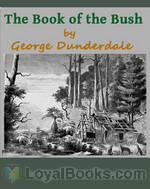 The Book of the Bush
The Book of the Bush
While the world was young, nations could be founded peaceably. There was plenty of unoccupied country, and when two neighbouring patriarchs found their flocks were becoming too numerous for the pasture, one said to the other: "Let there be no quarrel, I pray, between thee and me; the whole earth is between us, and the land is watered as the garden of Paradise. If thou wilt go to the east, I will go to the west; or if thou wilt go to the west, I will go to the east." So they parted in peace.(excerpt from book) | |
By: William Henry Holmes (1846-1933) | |
|---|---|
 A Study Of The Textile Art In Its Relation To The Development Of Form And Ornament
A Study Of The Textile Art In Its Relation To The Development Of Form And Ornament
| |
By: Edith E. Wiggin | |
|---|---|
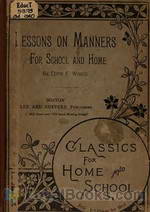 Lessons on Manners for Home and School Use
Lessons on Manners for Home and School Use
It is true that good manners, like good morals, are best taught by the teacher's example. It is also true that definite lessons, in which the subject can be considered in its appropriate divisions, are of no little value if we would have our children attain to "that finest of the fine arts, a beautiful behavior." (From the author's Introduction) | |
By: C. Houston (Charles Houston) Goudiss (1880-) | |
|---|---|
 Foods That Will Win The War And How To Cook Them (1918)
Foods That Will Win The War And How To Cook Them (1918)
| |
By: Willis J. Abbot (1863-1934) | |
|---|---|
 Aircraft and Submarines
Aircraft and Submarines
"Aircraft and Submarines" is a history of the development of these forms of transportation and their ultimate use in warfare. Also a brief history of submarine use in commercial applications. A thoroughly enjoyable piece for anyone interested in the detailed development of these modes of transportation. | |
 American Merchant Ships and Sailors
American Merchant Ships and Sailors
| |
 The Naval History of the United States Volume 1
The Naval History of the United States Volume 1
| |
By: J Hudson Taylor (1832-1905) | |
|---|---|
 Union and Communion - or Thoughts on the Song of Solomon
Union and Communion - or Thoughts on the Song of Solomon
This little book, whose design is to lead the devout Bible student into the Green Pastures of the Good Shepherd, thence to the Banqueting House of the King, and thence to the service of the Vineyard, is one of the abiding legacies of Mr. Hudson Taylor to the Church. In the power of an evident unction from the Holy One, he has been enabled herein to unfold in simplest language the deep truth of the believer's personal union with the Lord, which under symbol and imagery is the subject of The Song of Songs. (From the Foreword by J Stuart Holden). | |
By: William Tecumseh Sherman (1820-1891) | |
|---|---|
 Sherman’s Recollections of California, 1846-1848, 1855-1857, from his Memoirs
Sherman’s Recollections of California, 1846-1848, 1855-1857, from his Memoirs
This librivox recording comprises three chapters from American Civil War General William Tecumseh Sherman’s Memoirs. The chapters deal with a posting to California in his pre-Civil War military career in the years 1846-1848. While many of his colleagues saw action in the Mexican-American War, Sherman performed administrative duties in the captured territory of California. Along with fellow Lieutenants Henry Halleck and Edward Ord, Sherman embarked from New York on the 198-day journey around Cape Horn aboard the converted sloop USS Lexington... | |
By: Northern Nut Growers Association [Editor] | |
|---|---|
 Northern Nut Growers Association, report of the proceedings at the sixth annual meeting Rochester, New York, September 1 and 2, 1915
Northern Nut Growers Association, report of the proceedings at the sixth annual meeting Rochester, New York, September 1 and 2, 1915
| |
By: Grace Rogers Cooper | |
|---|---|
 The Scholfield Wool-Carding Machines
The Scholfield Wool-Carding Machines
| |
By: Walter Lippmann (1889-1974) | |
|---|---|
 Public Opinion
Public Opinion
Public Opinion (1922), by Walter Lippman, is a critical assessment of functional democratic government, especially the irrational, and often self-serving, social perceptions that influence individual behavior, and prevent optimal societal cohesion. (Introduction by author) | |
By: Apicius | |
|---|---|
 Cookery and Dining in Imperial Rome
Cookery and Dining in Imperial Rome
| |
By: Samuel D. Gordon (1859-1936) | |
|---|---|
 Quiet Talks on Prayer
Quiet Talks on Prayer
An open life, an open hand, open upward, is the pipe line of communication between the heart of God and this poor befooled old world. Our prayer is God’s opportunity to get into the world that would shut Him out. (From the first chapter) | |
By: Sarah Knowles Bolton | |
|---|---|
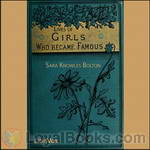 Lives of Girls Who Became Famous
Lives of Girls Who Became Famous
This book is a collection of short biographies of notable women, including Harriet Beecher Stowe, Louisa May Alcott, Florence Nightingale, and many others. | |
By: Confucius (551 BCE-479 BCE) | |
|---|---|
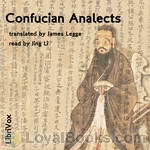 Confucian Analects
Confucian Analects
The Analects, or Lunyu (simplified Chinese: 论语; traditional Chinese: 論語; pinyin: Lún Yǔ; literally "Classified/Ordered Sayings"), also known as the Analects of Confucius, are considered a record of the words and acts of the central Chinese thinker and philosopher Confucius and his disciples, as well as the discussions they held. Written during the Spring and Autumn Period through the Warring States Period (ca. 475 BC - 221 BC), the Analects is the representative work of Confucianism and continues to have a substantial influence on Chinese and East Asian thought and values today... | |
By: Patanjali | |
|---|---|
 The Yoga Sutras of Patanjali
The Yoga Sutras of Patanjali
Yoga sutras by Patanjali is a seminal work in yoga, this book is more about control of mind and the true goal of yoga. The sutras are extremely brief, and the translation in neat English makes it very easy for people to understand the ancient Sanskrit text. It starts with the birth and growth of spiritual man through the control of mind. In all, this is a "all in one" book for yoga philosophy written by the master himself. | |
By: Isabella L. Bird (1831-1904) | |
|---|---|
 Unbeaten Tracks in Japan
Unbeaten Tracks in Japan
Isabella Lucy Bird was a 19th century English traveller, writer, and natural historian. She was a sickly child, however, while she was travelling she was almost always healthy. Her first trip, in 1854, took her to America, visiting relatives. Her first book, The Englishwoman in America was published anonymously two years later. Unbeaten Tracks in Japan is compiled of the letters she sent to her sister during her 7 months sojourn in Japan in 1878. Her travels there took her from Edo (now called Tokyo) through the interior - where she was often the first foreigner the locals had met - to Niigata, and from there to Aomori... | |
By: John T. Schlebecker | |
|---|---|
 Agricultural Implements and Machines in the Collection of the National Museum of History and Technology Smithsonian Studies in History and Technology, No. 17
Agricultural Implements and Machines in the Collection of the National Museum of History and Technology Smithsonian Studies in History and Technology, No. 17
| |
By: Dion Clayton Calthrop (1878-1937) | |
|---|---|
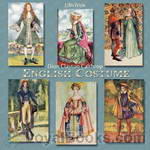 English Costume
English Costume
The world, if we choose to see it so, is a complicated picture of people dressing and undressing. The history of the world is composed of the chat of a little band of tailors seated cross-legged on their boards; they gossip across the centuries, feeling, as they should, very busy and important. As you will see, I have devoted myself entirely to civil costume—that is, the clothes a man or a woman would wear from choice, and not by reason of an appointment to some ecclesiastical post, or to a military calling, or to the Bar, or the Bench. Such clothes are but symbols of their trades and professions, and have been dealt with by persons who specialize in those professions. | |
By: Charles Alexander Eastman (1858-1939) | |
|---|---|
 Indian Child Life
Indian Child Life
The author was raised as an American Indian and describes what it was like to be an Indian boy (the first 7 chapters) and an Indian Girl (the last 7 chapters). This is very different from the slanted way the white man tried to picture them as 'savages' and 'brutes.'Quote: Dear Children:—You will like to know that the man who wrote these true stories is himself one of the people he describes so pleasantly and so lovingly for you. He hopes that when you have finished this book, the Indians will seem to you very real and very friendly... | |
By: Charles Alexander Eastman (1858-1939) | |
|---|---|
 Indian To-day
Indian To-day
Based in part upon the author's own observations and personal knowledge, it was the aim of the book to set forth the status and outlook of the North American Indian. He addressed issues such as Indian schools, health, government policy and agencies, and citizenship in this book. In connection with his writings, Eastman was in steady demand as a lecturer and public speaker with the purpose of interpreting his race to the present age. | |
By: Jean-Henri Fabre (1823-1915) | |
|---|---|
 Life of the Fly, With Which are Interspersed Some Chapters of Autobiography
Life of the Fly, With Which are Interspersed Some Chapters of Autobiography
The title tells all, along with other observations on insect life from the famed accidental entomologist of 19th Century France.. | |
By: Gustave Le Bon (1841-1931) | |
|---|---|
 Crowd
Crowd
"Civilisations as yet have only been created and directed by a small intellectual aristocracy, never by crowds. Crowds are only powerful for destruction. Their rule is always tantamount to a barbarian phase. A civilisation involves fixed rules, discipline, a passing from the instinctive to the rational state, forethought for the future, an elevated degree of culture — all of them conditions that crowds, left to themselves, have invariably shown themselves incapable of realising. In consequence of the purely destructive nature of their power crowds act like those microbes which hasten the dissolution of enfeebled or dead bodies... | |
By: Maria Parloa (1843-1909) | |
|---|---|
 Chocolate and Cocoa Recipes and Home Made Candy Recipes
Chocolate and Cocoa Recipes and Home Made Candy Recipes
A selection of chocolate recipes which were produced for Walter Baker & Co, the oldest producer of chocolate in the United States. Advertisements used by Walter Baker & Co can be found in Section 7. They are read by: Cori Samuel, Peter Why, David Lawrence, BookAngel7, ashleighjane and Joanne Rochon. | |
 Miss Parloa's New Cook Book
Miss Parloa's New Cook Book
| |
By: Gertrude Burford Rawlings | |
|---|---|
 The Story of Books
The Story of Books
Rawlings follows the development of printing from the origins of writing to modern printing. Some of the earliest records are ancient Egyptian, Greek and Roman recordings on papyrus and wax tablets. However, Rawlings acknowledges the sparse nature of this first fragile evidence, and limits speculation.Later, libraries of religious books grew in Europe, where monks copied individual books in monasteries. The "block printing" technique began with illustrations carved in wood blocks, while the text needed to be written by hand... | |
By: Sarah Tyson Heston Rorer (1849-1937) | |
|---|---|
 Sandwiches
Sandwiches
| |
 Made-Over Dishes
Made-Over Dishes
| |
By: Edith Birkhead (1889-1951) | |
|---|---|
 Tale of Terror: A Study of the Gothic Romance
Tale of Terror: A Study of the Gothic Romance
A seminal essay on the development of horror as a genre, highly influential on later writers. | |
By: Peter Fisher (1782-1848) | |
|---|---|
 History of New Brunswick
History of New Brunswick
Originally published in 1825 under the title: Sketches of New Brunswick : containing an account of the first settlement of the province, with a brief description of the country, climate, productions, inhabitants, government, rivers, towns, settlements, public institutions, trade, revenue, population, &c., by an inhabitant of the province. The value of this history is in the fact that it was written when the Province was still in its infancy. Although there had been a few small settlements established in New Brunswick prior to 1783, the main influx of settlers were Loyalists who chose to remove to the area from the United States following the American Revolution. | |
By: George Washington Sears (1821-1890) | |
|---|---|
 Woodcraft
Woodcraft
| |